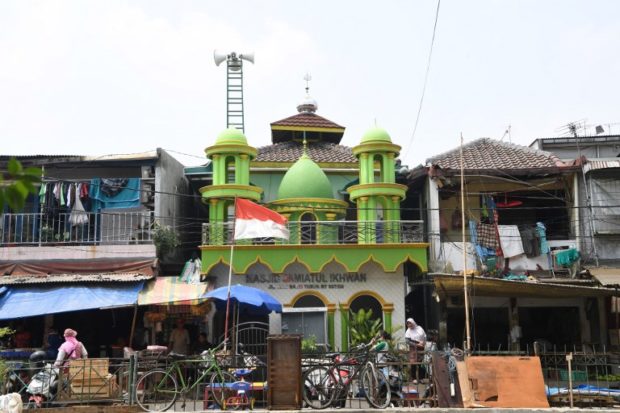Indonesian family seeks justice in Asian Games crime crackdown

A neighborhood mosque where Dedy Sukma, who Indonesian police accused of stealing a motorcycle before he was shot and killed for trying to wrestle away an officer’s pistol, used to lived in Jakarta, on August 30, 2018. AFP
JAKARTA, Indonesia — Indonesian police say they shot Dedy Sukma after the accused motorcycle thief tried to wrestle away an officer’s pistol.
But Sukma’s family doesn’t buy that account and is fighting for straight answers about why the 33-year-old died in a Jakarta slum just a month before host Indonesia kicked off the Asian Games, the world’s second-biggest multi-sport event.
Sukma was one of dozens of suspected petty thieves who have been killed by police in a crime crackdown ahead of the regional olympics, which started August 18 and ends Sunday.
“Why did they have to kill him? They treated his life as if it has no meaning,” a relative, who asked to remain anonymous, told AFP in an interview.
“In Indonesia, little people like us don’t get any protection from the law.”
Article continues after this advertisementAFP agreed not to use Dedy Sukma’s real name because his family— which filed a formal complaint with Indonesia’s human rights commission on Thursday— fears retribution.
Article continues after this advertisementRights groups have slammed what they call a shoot-first-and-ask-questions-later police operation in host city Jakarta and South Sumatra in the lead-up to the Games, which draws some 11,000 athletes from 45 nations.
Thousands of street-crime suspects have been arrested in recent months and nearly 80 have been shot dead nationwide since January, according to Amnesty International.
Over 30 deadly shootings happened as police ramped up their crackdown before the Games kicked off, it said.
“These shocking figures reveal a clear pattern of unnecessary use of force, or excessive use of firearms, committed by the police,” said Usman Hamid, executive director of Amnesty’s Indonesia office.
“Hosting an international multi-sports event must not come at the price of abandoning human rights.”
‘Four against one’
Authorities say that shooting thieves and muggers who were armed or attempted to flee was necessary to clean up the streets so athletes and other international visitors did not become crime victims.
“We don’t want those kind of things happening, especially during the Asian Games when the world is watching us,” said national police chief Tito Karnavian.
“If, at the time of the arrest, the person resists and endangers the officer it would be ridiculous for the officer to not doing anything,” he added.
Sukma’s family says that the youngest of three siblings— who had finished a two-year-sentence for motorcycle theft in June — walked with a limp and was handcuffed when he died, making it unlikely that he tried to overpower police.
According to police, the shooting happened as Sukma led them to a location where a local crime syndicate, which he was allegedly linked to, was hiding stolen motorbikes.
But his family— who insist Sukma was innocent— say the man’s body showed signs of torture, including cigarette burns and the bloody outline of handcuff marks on his wrists.
“Was he really shot (in self defense) or have they been targeting him for a while?” his relative asked.
“There were four police officers and he was alone. It was four against one.”
She added that police gave her an envelope with what they said was “sorrow money”— a common offering to the relatives of the dead in Indonesia.
“I want justice – I don’t want money,” Sukma’s relative added.
The family’s description of Sukma as kind, loyal son was at odds with accounts of some neighbours who saw him as a rude, heavy drinker always in trouble.
Whatever the truth, there are unanswered questions about Sukma’s death at the hands of Indonesian police, who are widely seen as corrupt and frequently operating above the law.
“Did these suspects really run away or resist arrest? I’ve wondered how the police could be so accurate in hitting a person who was running away from them,” said Agustinus Pohan, a law professor at Indonesia’s Parahyangan University.
“Even before the Asian Games, police have long used excessive force on street criminals. /ee
Agence France-Presse